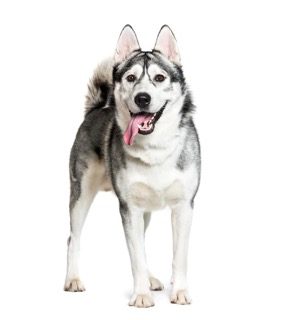
The Siberian Husky is an ancient sled dog breed that is believed to have originated in Northeast Asia. They have a wolf-like build, medium size, and a double coat with a soft, dense undercoat and a long guard coat. Their coat can range from black and white to all manner of colors and markings. They have a broad, wolf-like head, almond-shaped eyes, and small ears which makes them unique in their appearance. These dogs can range in size from 40- 60 pounds for a standard, but there are toy and giant varieties.
What makes these dogs stand out is their remarkable endurance, strength and intelligence. They do, however, require training tailored to their independent nature and natural aloofness with strangers. Every Husky has an individual personality, and they have a reputation for being friendly, gentle, and sociable. They are an active breed and need plenty of space to work off their energy.
The Siberian Husky is an intelligent, playful and friendly dog breed that is popular among many families. They have a gentle, patient, and tolerant nature and can get along well with children and other pets if given appropriate socialization and early training. Siberian Huskies have a moderate amount of energy and need at least an hour of daily exercise to stay healthy. They are not necessarily suited to living indoors and tend to be quite vocal. Walking, running, and playing are great suitable activities to ensure both physical and mental stimulation for the Siberian Husky. They form strong, dedicated bonds with their owner and enjoy spending quality time with their family.
The Siberian Husky is a strong, active breed that requires plenty of physical activity to stay healthy and fit. These dogs should be fed a high-quality diet that meets their energy requirements for their size and activity level. It is important to feed an appropriate amount of food to prevent overfeeding and obesity. Keeping your Siberian Husky at a healthy body weight will help keep them active and less prone to developing common health problems. Proper nutrition is an essential part of creating a healthy and balanced lifestyle for your Husky. Grooming needs should include brushing, bathing, and ear cleaning, depending on the needs of the individual dog.
Responsible pet ownership includes providing a balanced diet and nutritious food for your Husky and making sure your dog receives the necessary veterinary care. To learn more about this breed, check out Way Canina, where you can find helpful information about what foods are okay for Siberian Huskies to eat and what to avoid in order to keep your pup healthy. With a balanced diet, regular exercise and proper care, your Husky can live a happy, healthy, and active life.
Common health issues for huskies include hip and elbow dysplasia, cataracts, epilepsy, and heart disease. While some of these conditions may be genetic, regular check-ups and preventive care can help reduce the risk of developing serious health problems.
The average lifespan of a Siberian husky is between 12 and 15 years, although some can live longer. Factors that influence their longevity include genetics, diet, exercise, and preventive healthcare, such as regular veterinary check-ups and vaccinations.
Are you thinking about getting a Siberian Husky or do you already own one? Owning a Siberian Husky comes with many responsibilities and both pros and cons. Before making this big decision, take the time to research the breed. Check out our blog posts and articles at Way Canina that compare different breeds and can provide you with extra information about their lifestyle and wellbeing.